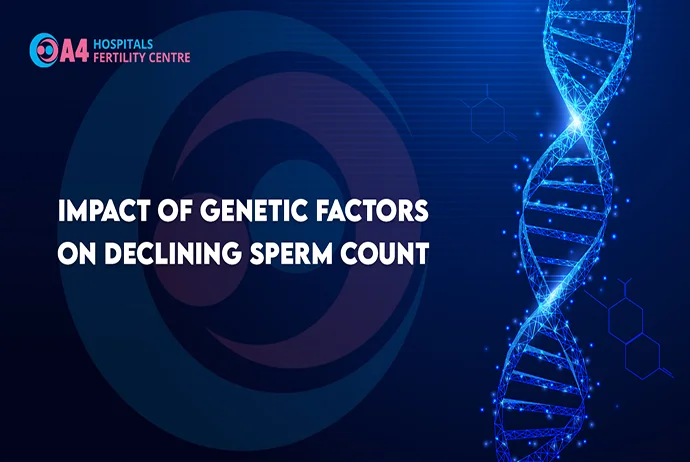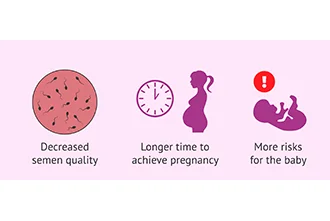
Dr. Aruna Ashok MBBS, MS OG, DNB OG
- Clinical Director

In the past few decades, sperm count and male fertility as a whole have declined, generating concerns about the potential causes of this trend. Emerging research suggests that genetic factors may also play a role in sperm count and fertility, in addition to environmental factors, lifestyle choices, and overall health. In this article, we will examine the influence of genetic factors on sperm count decline and its implications for male fertility.


Chromosomal abnormalities, such as Klinefelter syndrome, can negatively affect sperm production and result in reduced sperm count. This is a genetic condition in which a male is born with an extra X chromosome. This additional chromosome can lead to smaller testicles, reduced testosterone levels, and impaired sperm production. Men with Klinefelter syndrome often have low sperm counts or may be infertile.
The Y chromosome plays a critical role in male fertility, as it contains several genes responsible for sperm production. Microdeletions, or small missing segments of DNA, on the Y chromosome, can disrupt these genes and lead to impaired sperm production. Men with Y chromosome microdeletions may experience reduced sperm count or even a complete absence of sperm in their semen (azoospermia).
Mutations in specific genes can also contribute to declining sperm count and male infertility. For example, mutations in the CFTR gene, which cause cystic fibrosis, can lead to congenital bilateral absence of the vas deferens (CBAVD) in males. CBAVD results in the obstruction of sperm transport, causing low sperm count or azoospermia. Additionally, mutations in other genes involved in sperm production, hormonal regulation, and sperm function can contribute to reduced sperm count and impaired fertility.
Epigenetic changes refer to modifications in gene expression without altering the underlying DNA sequence. Environmental factors, such as exposure to toxins or poor nutrition, can cause epigenetic changes that impact sperm count and fertility. Moreover, these changes can be passed down to subsequent generations, potentially affecting their fertility as well.
Understanding the role of genetic factors in declining sperm count has significant implications for assisted reproductive technologies (ART) like in vitro fertilization (IVF) and intracytoplasmic sperm injection (ICSI). Identifying specific genetic abnormalities or mutations can help fertility specialists tailor treatment plans to address these issues and optimize success rates.
For instance, men with Y chromosome microdeletions may benefit from ICSI, where a single sperm is injected directly into an egg to achieve fertilization. This technique can overcome sperm count limitations and improve the chances of successful conception.
Genetic variables can significantly influence sperm quantity and male fertility. Understanding these variables can assist healthcare workers and fertility specialists in developing targeted therapy strategies to handle the particular reasons of sperm count decline. It is critical to understand that hereditary variables are only one component of the equation; external factors, living decisions, and general health all play a part in sperm quantity and fertility.
If you're worried about your sperm count or male fertility, you should see a healthcare expert or fertility doctor like those at A4 Fertility Clinic. Our team of specialists can help you identify possible hereditary, environmental, or behavioral variables that are causing your reproductive issues and create a thorough therapy plan that is customised to your specific requirements. We strive to provide the best possible assistance on your path to parenting by merging cutting-edge genetic testing with a comprehensive approach to conception.